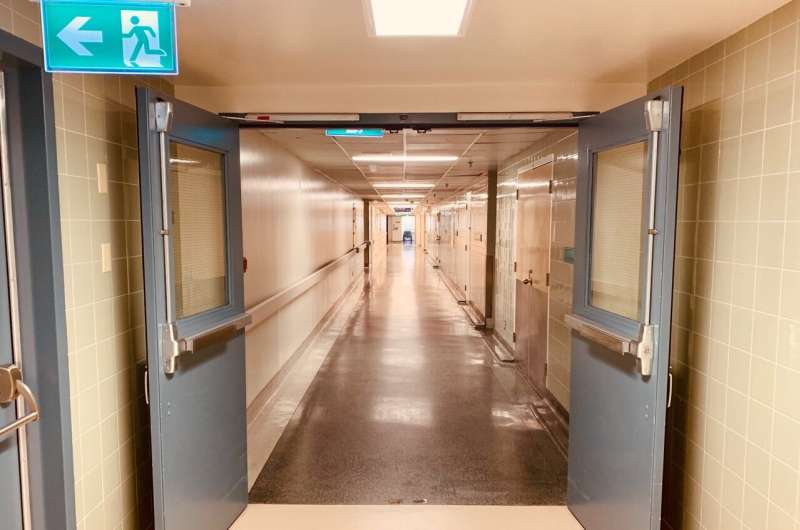Government watchdog: One in four older Americans on Medicare harmed during hospital stays

One in four older Americans covered by Medicare had some type of temporary or lasting harm during hospital stays before the COVID-19 pandemic, government investigators said in an oversight report published Thursday.
The report from the U.S. Department of Health and Human Services Office of Inspector General said 12% of patients had "adverse events" that mainly led to longer hospital stays but also permanent harm, death, or required life-saving intervention. Another 13% had temporary issues that could have caused further complications had hospital staff not acted.
Investigators reviewed the medical records of 770 Medicare patients discharged from 629 hospitals in 2018 to formulate a national rate on how often patients were harmed, whether preventable or not. An earlier Inspector General review published in 2010 found that 27% of patients experienced some type of harm—an investigation that led to new patient safety efforts and incentives.
The incremental improvement follows an intense focus on patient safety since at least 1999 when the then-Institute of Medicine published To Err is Human, a landmark report that estimated up to 98,000 deaths per year could be due to medical errors. Initiatives have since sought to improve patient safety by limiting medical errors, reducing medication mix-ups and holding hospitals with a poor record of patient safety accountable through Medicare's program to dock the pay of the worst performers on a list of safety measures.
While Inspector General investigators noted improvements in certain safety measures, officials said the 25% harm rate is concerning and deserves renewed attention from hospitals and two federal agencies that oversee patient safety: the Centers for Medicare and Medicaid Services and the Agency for Healthcare Research and Quality.
"We still have a significant way to go in terms of improving patient safety," said Amy Ashcraft, a deputy regional inspector general.
Among the Inspector General's recommendations: Broaden the types of complications evaluated under Medicare's pay-for-performance program.
One pay-for-performance program, created by the Affordable Care Act, cuts 1% of Medicare pay for hospitals ranked at the bottom tier for complications such as infections, hip fractures, blood clots, bleeding, or sepsis.
But of the harm examples uncovered by the Inspector General, only 5% would be complications now evaluated under Medicare's pay-for-performance program. In other words, hospitals don't face reduced payments for the vast majority of complications.
The report found a smaller percentage of harm cases would be flagged under another Medicare program, created by the 2005 Deficit Reduction Act, that aims to limit extra payments for complications that are likely preventable.
The report found the most common types of harm included medication side effects; other common issues included bedsores, surgery complications and infections.
Nashville nurse's conviction chills safety
Other studies suggested the nation's health care system made strong gains in preventing or reducing infections before COVID-19 stressed hospitals, nursing homes and other health facilities.
Infections for "central line" catheters inserted in patients' veins dropped 31% at U.S. hospitals five years before the pandemic. But those infections surged 28% from April through June 2020, the frenzied period when COVID-19 began to spread rapidly, according to a February paper in New England Journal of Medicine.
COVID-19 stressed U.S. hospitals as the ranks of doctors, nurses and other caregivers were stretched thin, said Dr. Michael Ramsey, chief executive officer of the Patient Safety Movement Foundation, a nonprofit based in Irvine, California.
But Ramsey believes hospitals are poised to recover safety gains lost during COVID-19. He cited Medicare's 1% payment reductions for poor performers as a motivating factor for hospitals to improve.
"It's got to come from the top down," Ramsey said. "You've got to have the board's bonuses based on safety in the hospital, all the way down to the lowest-paid person."
Hospitals also must emphasize routines to prevent infections, such as doctors and nurses washing their hands and verifying patients' names before administering medications, he said. Hospital workers must feel comfortable speaking up when they notice problems.
RaDonda Vaught is a former Nashville, Tennessee, ICU nurse who was found guilty in March of criminally negligent homicide after giving the wrong medication to a Vanderbilt University Medical Center patient who died. She is scheduled to be sentenced on Friday.
From the outset, Vaught admitted to the mistake. In a recent interview, she told The Tennessean she has "zero regrets about telling the truth."
Nurses nationwide are watching the outcome of the case, and Ramsey believes it has the potential to have a chilling effect on workers who would otherwise speak up about patient safety issues they notice.
"It's going to set things back because people are not going to speak up as readily as she spoke up," Ramsey said.
It's also important that patients and their families be comfortable raising concerns and asking questions to nurses and doctors, said Melissa Mullamphy, a Holmes, New York, blogger who self-published a book detailing her efforts to navigate the medical system during her mother's battle with cancer.
She urges patients and their families to ask about medications, staffing levels, and treatment plans and recommends they research patient safety grades of hospitals on public websites such as CMS Hospital Compare or private websites.
"There are ways you can protect your loved ones," Mullamphy said. "You have to be assertive, and you have to ask the hard questions."
(c)2022 USA Toda
Distributed by Tribune Content Agency, LLC.


















